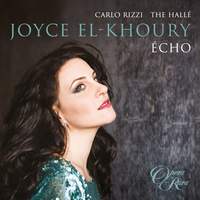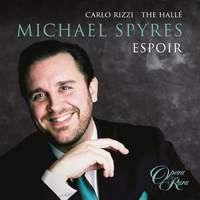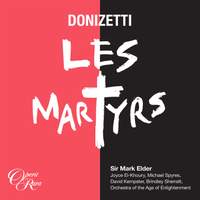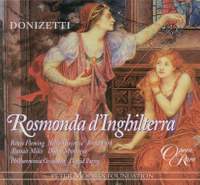Interview,
Joyce El-Khoury on Écho
 Blessed with old-school vocal and physical glamour and a richly-coloured, flexible soprano that shines particularly brightly in Verdi, Bellini and Donizetti, the Lebanese-Canadian soprano Joyce El-Khoury is seriously hot property at the moment: this year so far she's taken Covent Garden and Glyndebourne by storm in La Traviata, and this week sees the release of her first full-length solo recording, Ècho, on Opera Rara. The disc explores the wide variety of roles written and adapted for the Belgian soprano Julie Dorus-Gras (1805-96), and is released in tandem with an album from Joyce's fellow Opera Rara stablemate Michael Spyres which focuses on the career of Dorus-Gras's regular stage-partner Gilbert Duprez (more on that next week...!). Spyres and El-Khoury had huge success together in 2015 as Polyeucte and Pauline on the first ever complete recording of Donizetti's Les Martyrs (also on Opera Rara) which was shortlisted for a Gramophone Award, and their vocal chemistry is once again in evidence here in their guest appearances on one another's solo discs.
Blessed with old-school vocal and physical glamour and a richly-coloured, flexible soprano that shines particularly brightly in Verdi, Bellini and Donizetti, the Lebanese-Canadian soprano Joyce El-Khoury is seriously hot property at the moment: this year so far she's taken Covent Garden and Glyndebourne by storm in La Traviata, and this week sees the release of her first full-length solo recording, Ècho, on Opera Rara. The disc explores the wide variety of roles written and adapted for the Belgian soprano Julie Dorus-Gras (1805-96), and is released in tandem with an album from Joyce's fellow Opera Rara stablemate Michael Spyres which focuses on the career of Dorus-Gras's regular stage-partner Gilbert Duprez (more on that next week...!). Spyres and El-Khoury had huge success together in 2015 as Polyeucte and Pauline on the first ever complete recording of Donizetti's Les Martyrs (also on Opera Rara) which was shortlisted for a Gramophone Award, and their vocal chemistry is once again in evidence here in their guest appearances on one another's solo discs.
In between her performances as Violetta at Glyndebourne (described as 'deeply affecting' by BachTrack), Joyce spoke to me about her exploration of Dorus-Gras's remarkable career and legacy, her own affinity with bel canto, and the pivotal role which Opera Rara has played in her career to date.
As there are no recordings of this singer, we have no first-hand evidence as to what she sounded like – but what does the music that she inspired tell us about her voice?
Having sung a lot of the music that she did, what I can tell you is that she was extremely versatile. She commanded every aspect of her voice, and it wasn’t so much that the music was shaped for her – I feel that she shaped her voice for the music. It seems that she always fine-tuned her technique or altered the way she sang to fit whatever she was working on at that moment. And she seemed quite fearless, actually, because as far as I can tell she never looked at anything and thought ‘Well, I can’t sing that’ or ‘It’s too difficult’ – she just worked on her technique!
It seems that she didn’t like to sing very low – a lot of her repertoire sits pretty high. During that period singers didn’t have much vibrato; they weren’t as loud as singers today were required to be. But she had a lot of agility, and (from what I've read about her) real beauty of tone, as well as great clarity and pristine intonation - and that’s very evident in the repertoire she sang, which demands exactitude of notes and musicality and dynamics. She was always studying to make herself better, and it’s evident in this extremely difficult repertoire!
How much do we know about her personal life and personality?
Well, we know that she was born in France, into a musical family, and that she married a violinist (that’s where the 'Gras' part of her name comes from) – but beyond that we don’t know all that much about her personally. What IS pretty clear is that she didn’t go in for diva-like behaviour: when she premiered Hérold’s Le Pré aux Clercs (an aria from which features on the disc) she wasn’t even scheduled to sing – the opera had already premiered with another soprano, but after opening night she said she was ill and didn’t continue. Whether or not that’s true we'll never know, but Julie learned the opera in four or five days and went on to great success. She doesn’t seem to have had much of an ego - she appeared to really serve the music, work hard, and just get on with things! In my imagination, she seems like such an eternal student, and I feel that that comes with a certain amount of humility.
The professional relationship with Gilbert Duprez [the tenor who's the subject of Michael Spyres's twin disc, Espoir, on which Joyce also appears] was really central to her career…
Duprez was such an eccentric, unique person, like Michael [Spyres] in a way! Michael exudes this larger-than-life quality, and I have the impression that Duprez was like that too - I think what made it work between Dorus-Gras and Duprez was this shared passion and love for what they did, as well as the love of a challenge, which is also kind of like Michael and I!
The aria from the French version of Der Freischütz is a real curiosity! Is it very different from Weber’s original, and is Agathe something you’d consider singing in a full production?
Never say never, but I don’t think I’d sing Agathe - it’s a much heftier role and I can’t imagine anybody asking me to do it, at least not at the moment! The reason we decided to include this aria was that Julie sang it a lot in concert, in French (in fact there are two or three different French versions of Der Freischütz). I consciously wanted to create a real prayer-like atmosphere on that track – that mood is emphasised in the French text and I really played with the colours there. I don’t know whether I would be able do that kind of thing in the context of a full production in an opera-house, but it actually records really well!
How did your relationship with Opera Rara come about, and what role has it played in your career so far?
When I was a student at the University of Ottawa, I used to work at the music library, where I had access to countless CDs and DVDs. One of the first recordings I listened to when I was 'nerding out' there was Donizetti's Rosmonda d’Inghilterra with Renée Fleming, which was an Opera Rara disc [recorded in 1994]. That was the first time I encountered them, and I was so intrigued by what they were doing. Then ten years later I was a Young Artist at the Metropolitan Opera and John Fisher [the opera director, vocal coach and manager], who had hired me to sing Violetta at Welsh National Opera, worked with us a couple of times every season. Around that time he was doing casting for Opera Rara along with Sir Mark [Elder], and he recommended me for [Donizetti’s] Belisario in 2012, which was the first recording I did with Sir Mark and also the first recording I made with the label. At that point it was the most important engagement of my career, and it really put me on the map. And then of course came Les martyrs...
I’ve always felt that bel canto is what my voice really likes: it’s what I really love and feel I was born to sing, it’s my life purpose. Rarities are what I adore and what I seem to be in demand for, and it’s all thanks to Opera Rara. I think we need to give people the opportunity to hear this music that's fallen by the wayside, and decide for themselves whether they like it and whether it should become mainstream repertoire. That's Opera Rara’s mission, and it’s also mine!
What are your immediate and long-term plans in terms of bel canto repertoire?
I’m working on Lucia! When I first started out I never expected I would sing it, but it’s all leading that way – I’ve done Maria Stuarda, which was great fun, and next would be Anna Bolena, Elisabetta in Roberto Devereux, and one day Norma. There are other things I want to do first, but maybe in five years..! Next season I’m doing Il Pirata, firstly in Bordeaux in November (for the fortieth anniversary of Callas’s death) and then in St. Gallen in the spring, so that’s my most upcoming new role. And then there’s Donizetti’s L’Ange de Nisida at Covent Garden – that’s in concert, and will be recorded for Opera Rara. There’s some music that will literally never have been heard before, and the prospect of that is spine-tingling!
Finally, what’s the significance of the title – and was it your idea, or something that came from Opera Rara?
It was mine! I sat down with the texts of all the arias and made a list of words that are repeated, and ‘Écho’ crops up in Der Freischütz and in the Lucia duet, and three or four more tracks - it’s a really significant word in this repertoire. And that’s what I chose, because in a sense the project is an echo through time, an echo of Julie Dorus-Gras!
Écho is released on Opera Rara on Friday 8th September, and includes arias from operas by Berlioz, Donizetti, Halévy, Meyerbeer, Weber and more.
Available Formats: CD, MP3, FLAC, Hi-Res FLAC
Joyce appears in a duet from Halévy's Guido et Ginévra on Michael Spyres's tribute to Gilbert Duprez, also released next Friday.
Available Formats: CD, MP3, FLAC, Hi-Res FLAC
Other recordings referenced in this interview
Donizetti: Belisario
Nicola Alaimo (Belisario), Joyce El-Khoury (Antonina), Camilla Roberts (Irene), Russell Thomas (Alamiro), Alastair Miles (Giustiniano), Julia Sporsen (Eudora); BBC Symphony Orchestra, Sir Mark Elder
'El-Khoury’s naturally fast and highly distinctive soprano is hugely welcome in an age of increasing vocal homogeneity; she attacks the role’s considerable demands head-on and delivers a thrilling performance.' (Opera Now)
Available Formats: MP3, FLAC, Hi-Res FLAC
Donizetti: Les Martyrs
Michael Spyres (Polyeucte), Joyce El-Khoury (Pauline), David Kempster (Sévère), Brindley Sherratt (Félix), Clive Bayley (Callisthènes), Wynne Evans (Néarque); Orchestra of the Age of Enlightenment, Sir Mark Elder
'There’s no faulting the commitment of the singers. Spyres offers plenty of bel canto style and beautifully schooled phrasing...[El-Khoury's] performance as Pauline is hardly less remarkable, and tireless in bringing the character to life. ' (Gramophone)
Available Formats: MP3, FLAC, Hi-Res FLAC
Donizetti: Rosmonda d'lnghilterra
Bruce Ford (Enrico II), Nelly Miricioiu (Leonora di Guienna), Renée Fleming (Rosmonda Clifford), Alastair Miles (Clifford), Diana Montague (Arturo); London Philharmonic Orchestra, Geoffrey Mitchell Choir, David Parry
'The performance of this, Donizetti's 41st opera, could hardly be improved...Fleming shows once again that not only has she one of the most lovely voices of our time but that she's also a highly accomplished technician and a sympathetic stylist.' (Gramophone Guide)
Available Format: 2 CDs







